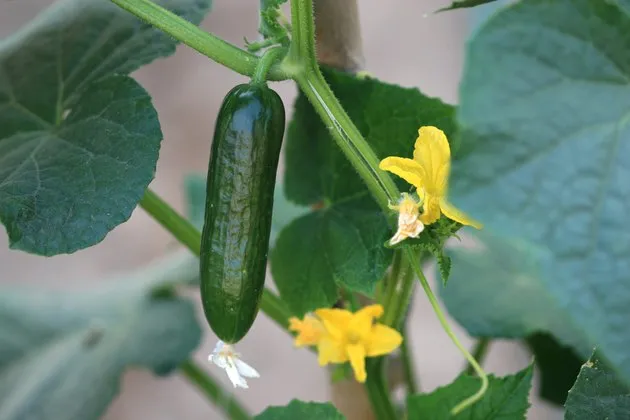What Is the Best Fertilizer for Cucumbers?

Cucumbers are well known annual vines developed all through the United States. They produce best during long, warm summer days. Standard cucumber vines develop quickly and need vertical support.
Dwarf cucumbers bolster themselves, and they grow well in small gardens and pots. Regardless of the kind of cucumber vine you’re growing, organic soil amendments meet their special nutrient requirements best.
Nutrient requirements
Cucumbers have low nitrogen prerequisites, yet they need high potassium and high phosphorus levels. If you are using commercial fertilizer formulas, this implies the first of the three numbers on the package ought to be much lower than the other two. In order to decide how much and what supplements your cucumbers need, it is best to know the soil type.
Sandy soils filter crucial substances and become nutrient-poor quickly. Heavy soils can lock up nutrients. Including compost in the soil improves most garden soil. The organic matter enriches light sandy soils and lightens heavy clay soils.
Nitrogen precautions
Be careful with overloading your cucumbers with general, all-purpose formulas that contain higher nitrogen levels. They may encourage growth, yet not in the manner in which you need. Since they have low nitrogen prerequisites, fertilizers high in nitrogen spark growth spurts that detract from the fruit.
Rather than creating blooms and organic product, nitrogen-bolstered cucumbers put their vitality into developing vines, leaves and shoots. High-nitrogen composts can likewise cause cucumber blossoms to not open, and cause opened blooms not to set fruits.
Cucumbers preferences
Well-matured manure is the best source of nutrients. Fertilizer just has 2 percent nitrogen, and it discharges gradually over many years. Compost won’t cause uncontrolled vegetative development at the cost of fruit production. Rather, it includes supplement holds that stay accessible in soil long haul.
Compost can be applied yearly as mulch or worked into your soil without causing excess nutrient buildup. It additionally supplies phosphorus, potassium and micronutrients that cucumbers need. Compost mulch additionally helps in preventing weeds to take over, so cucumbers get soil supplements.
In the event that you don’t make your very own compost, you can buy commercially bagged compost or bulk compost at most garden centers and nurseries.
Growing cucumbers in containers
Feed container cucumbers by mixing compost with your potting soil. You can likewise include a timed-released, low-nitrogen, high-potassium pelleted compost with a N-P-K proportion about 2-3-6. Apply 1 tablespoon for every pot at planting, and again when you see the main true leaves on your cucumbers.
For bigger containers, more than 12 inches in diameter or various plants in a single pot, increase the amount accordingly. After cucumbers show genuine leaves, apply water-soluble, low-nitrogen, high-potassium fertilizer weekly. Apply weekly fertilizers at half strength, mixing 1/2 tablespoon of fertilizer with 1 gallon of water. Always wear gloves and protective eyewear when working with fertilizers.


